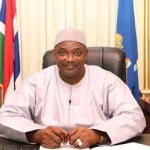An Open Letter Questions President Barrow's Political Future.
President Adama Barrow's recent statements about remaining in power have sparked concerns about The Gambia's democratic path. His April 2023 meeting with Muslim elders suggested plans to leave office after his second term. He discussed creating a foundation and recruiting staff, indicating clear intentions to step down.
Yet his supporters pushed a different message. They claimed the president meant something else, despite Barrow himself telling QTV's Alieu Ceesay he wanted to leave office. His party members convinced him to stay for the National People's Party's interests.
Critics point to troubling patterns among Barrow's current allies. Many supported the previous dictatorship and opposed Barrow's initial election. Some even forced him to seek refuge in Senegal after refusing to accept election results, leading thousands of Gambians to flee as refugees.
Questions arise about the loyalty of these political figures. They abandoned former president Jammeh after his defeat. Several critics who once opposed Barrow have switched sides, becoming ministers and officials. Their sudden praise for "Kairo Barrow" and support for extending his power raises doubts about their motives.
The letter draws parallels with past leaders' experiences. Both Jawara and Jammeh ended up in exile—Jawara, through a coup despite his democratic record, and Jammeh, after attempting to steal an election. Their fates serve as warnings about prolonged power.
Though The Gambia's constitution lacks term limits, the writer urges Barrow to consider his legacy. The country's unique story of defeating tyranny through voting stands out. The president's recent claim that he never sought the presidency conflicts with his reluctance to step down.
Barrow told QTV he stays in power because NPP remains "a very young party" that might not survive without him. Critics argue this puts party interests above national needs. They see capable young leaders ready to take charge.
The letter concludes by warning against a "dangerous cabal" seeking Barrow's extended rule for personal gain. It advises him to step down after his term and become a respected statesman rather than risk a fate similar to Senegal's Macky Sall.
President Adama Barrow's recent statements about remaining in power have sparked concerns about The Gambia's democratic path. His April 2023 meeting with Muslim elders suggested plans to leave office after his second term. He discussed creating a foundation and recruiting staff, indicating clear intentions to step down.
Yet his supporters pushed a different message. They claimed the president meant something else, despite Barrow himself telling QTV's Alieu Ceesay he wanted to leave office. His party members convinced him to stay for the National People's Party's interests.
Critics point to troubling patterns among Barrow's current allies. Many supported the previous dictatorship and opposed Barrow's initial election. Some even forced him to seek refuge in Senegal after refusing to accept election results, leading thousands of Gambians to flee as refugees.
Questions arise about the loyalty of these political figures. They abandoned former president Jammeh after his defeat. Several critics who once opposed Barrow have switched sides, becoming ministers and officials. Their sudden praise for "Kairo Barrow" and support for extending his power raises doubts about their motives.
The letter draws parallels with past leaders' experiences. Both Jawara and Jammeh ended up in exile—Jawara, through a coup despite his democratic record, and Jammeh, after attempting to steal an election. Their fates serve as warnings about prolonged power.
Though The Gambia's constitution lacks term limits, the writer urges Barrow to consider his legacy. The country's unique story of defeating tyranny through voting stands out. The president's recent claim that he never sought the presidency conflicts with his reluctance to step down.
Barrow told QTV he stays in power because NPP remains "a very young party" that might not survive without him. Critics argue this puts party interests above national needs. They see capable young leaders ready to take charge.
The letter concludes by warning against a "dangerous cabal" seeking Barrow's extended rule for personal gain. It advises him to step down after his term and become a respected statesman rather than risk a fate similar to Senegal's Macky Sall.












